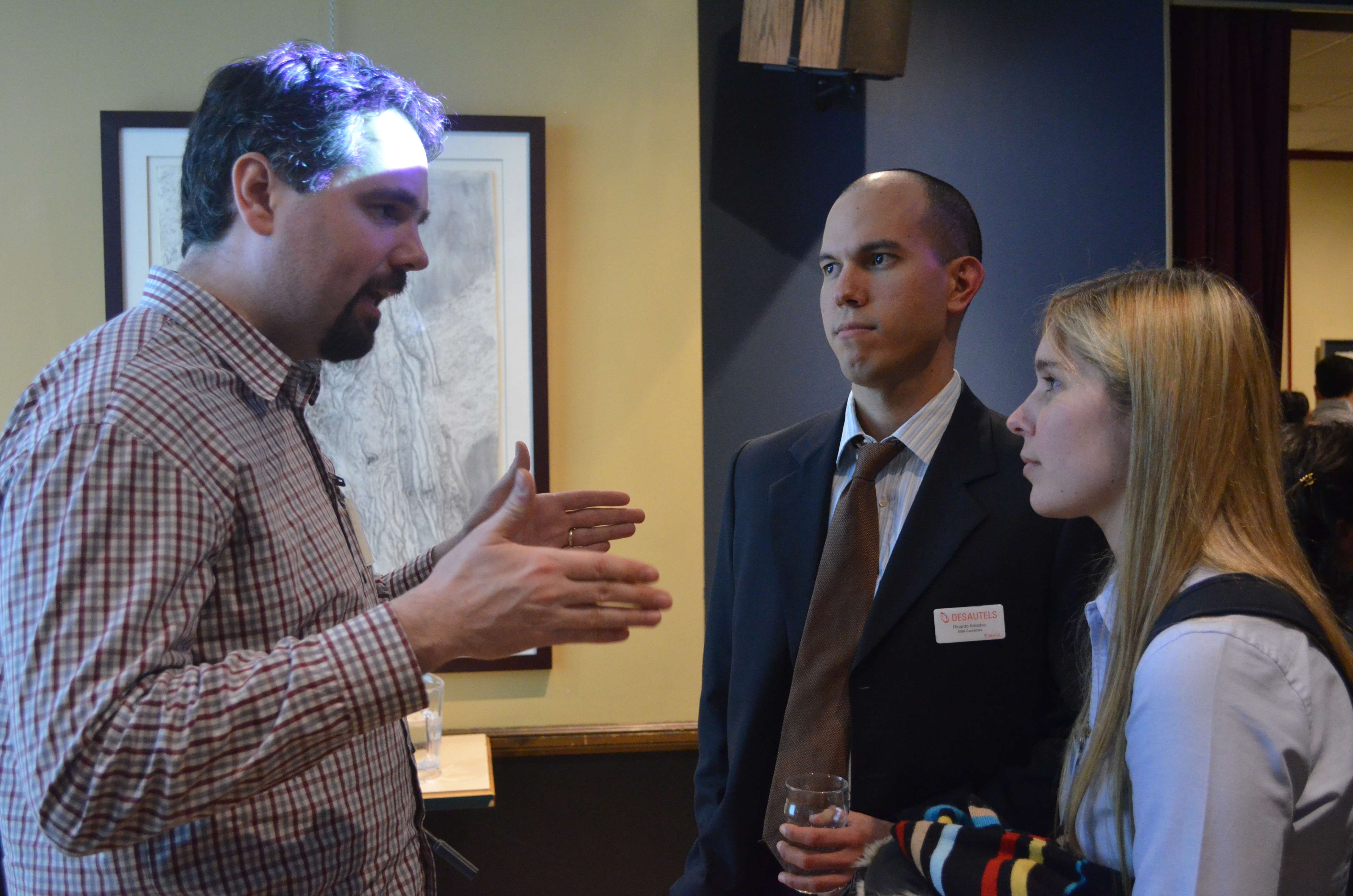You have a great idea for a revolutionary app that will make a huge difference in how we view the current technological industry. The problem is that you don’t have the money, contacts, or know-how to transform this idea into a marketable, profitable product. What do you do now?
The Science & Policy Exchange Monthly Networking Event held at Thomson House on Jan. 27 attempted to answer that question. Titled “The State of Entrepreneurship in Canada,” the event focused on the process of starting a company or business venture as a student, and the many resources available to help you accomplish this. It was organized by the non-profit organization Science & Policy Exchange (SPE), which consists of a team of volunteer graduate students and post-doctoral fellows whose aim is to bridge the gap between science and policy in Quebec and the rest of Canada.
“This is the first in a series of networking events that we will be holding in 2014 to facilitate cross-sector engagement between government, industry, academia, and the public,” said Fanny Dupuy, President of SPE. “These forums represent a great opportunity for graduate student professional development, which is often severely under-emphasized in their training curriculum.”
The night started with a talk by Charles Morand, an investment professional at BDC Venture Capital. The venture capital arm of the Business Development Bank of Canada (BDC) is a government-owned financial services corporation that specializes in early-stage technology investments. In exchange for funding, BDC acquires a portion of equity in the companies it invests in.
“Venture capitalists are basically private equity investors in that they own shares in privately held companies; but what differentiates them from other investors is that they take a primarily technology-based risk,” Morand explained.
And a high risk it is—the company invests potentially millions of dollars in struggling, inexperienced start-ups that could very easily fail and bring everyone involved down with them. For that reason, companies like BDC will only invest in extraordinary ideas that have a high potential for success.
“Venture capitalists will look for something that’s disruptive, or at least radical, meaning that the technology you bring into market has the potential to fundamentally transform and improve the way things are done,” Morand said.
While Morand’s venture investors cater to more established start-ups with fully formed ideas and teams, the second speaker of the night Helge Seetzen often works with as little as raw intellectual property or a single technology alone, with no marketable product in mind.
Seetzen is the CEO and co-founder of TandemLaunch Technologies, a technology-transfer company that specifically helps university inventors transform their project or idea into innovative products and companies.
Seetzen presented some eye-opening statistics. Despite boasting one of the largest investments in applied academic research in Canada, Quebec’s return on that capital based on the number and worth of successful companies produced is amongst the lowest in the country. Quebec university students are also steering clear from the entrepreneurship path.
“Quebec universities have the lowest [‘Yes’] response rate [in Canada] on surveys to the question of ‘Would you like to build a business?’” Seetzen said.
He added that this result may partially be due to the inefficiency of the innovation process at universities. Seetzen explained that the process of convincing your professor that your idea merits more than just a publication, gathering enough money from administration to file a patent, and finding the prospects to license or buy the patent is likely to go the usual snail’s pace of academia.
This is where Seetzen and his team step in. TandemLaunch seeks to tighten that feedback loop—they amalgamate the necessary funds, contacts, and corporate partnerships to jump-start your idea into a viable company in a matter of months when it would have taken at least two to three years otherwise.
McGill alumnus Alexander Danco, who graduated in 2011 with a B.Sc in physiology and received his M.Sc in neuroscience in 2013, and his back pain-tracking app “Backtrack” is one such tech sapling that is in the process of being nurtured and raised by TandemLaunch into a fully grown, stand-alone company.
“I started thinking about back pain […] when I was in grad studies here in the neuroscience program at McGill,” Danco said. “When I was approaching graduation […] the thought was, okay, once all this is published, have we actually cured anyone’s back pain? The answer was basically no, unfortunately.”
So Danco went through TandemLaunch’s Entrepreneur-in-Residence program to develop Backtrack, a wearable patch on your back that collects and correlates data on movement and pain in order to better treat the chronic ailment. Though still in its infancy, Backtrack is gaining momentum in the physiotherapy world, and you may be seeing this clever device on store shelves in the very near future.
The take-home message from the three presentations of the night was overwhelmingly urgent: university students need to start innovating and building companies, since our generation is the driver of future wealth creation.
Offering tips and advice to students looking to get into entrepreneurship, Seetzen recommended learning something about as much as possible, including finance, sales, business development, and people management, since all of these skills will be extremely useful in the long run.
“A start-up that understands how that technology translates into a business context and how it makes money and how those processes work, will always [overcome] a start-up that just has a good technology,” Seetzen said.
Full disclosure: Christine Tam is a blogger for SPE and a general member of the organizing committee.









Anyone interested in entrepreneurship should get: Personal Brand Planning for life, available on Amazon to determine your unique skill set and persona so that you can market your entrepreneurial idea(s) more effectively.
Great to see entrepreneurs and VCs spending time in universities to talk about entrepreneurship as a career path. For students looking for an overview of the startup ecosystem in Montreal, here is a post I wrote with 100+ resources: http://swell.lpmo.com/post/60910191019/entrepreneurship-in-montreal